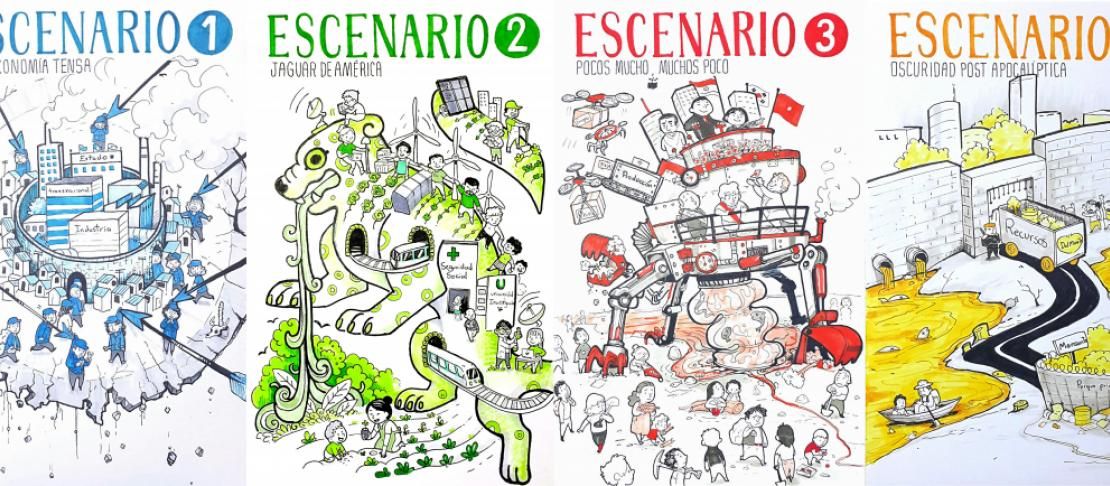Who will be the new 'Jaguars of America'?

The agriculture in Central America and the Dominican Republic is preparing for the future, betting on a joint vision of building climate resilience.
Just as economists coined the term 'Asian Tigers' for the countries of this region that had high development and industrialization for decades, by 2050 Central America and the Dominican Republic could be known as the new 'Jaguars of America'; indeed this animal, one of the largest felines in the world, is also venerated by the indigenous cultures of the region, being then a perfect name to baptize the economic, social and environmental development that Central America and the Dominican Republic seeks.
The CSA Strategy is an initiative led by the Central American Agricultural Council (CAC), through its Executive Secretariat under the coordination of the technical group on climate change and integrated risk management, in articulation with other technical groups, and supported by the inter-agency support unit composed by organizations such as ECLAC, FAO, IICA, CATIE, CIAT, CCAFS, among others.
Future Scenarios is a methodology developed by the CGIAR Research Program on Climate Change, Agriculture and Food Security (CCAFS) and the University of Oxford, which is implemented in Latin America by the University for International Cooperation (UCI).
This utopia is part of an academic exercise in which four future scenarios were created by a group of stakeholders from different sectors such as agriculture, the environment, academia, NGOs and the private sector of Belize, Costa Rica, El Salvador, Guatemala, Honduras, Nicaragua, Panama and the Dominican Republic.
A couple of weeks ago, they were all meeting in San José, Costa Rica, with the objective of contributing to the construction of the Climate-Smat Agriculture (CSA) Strategy for Central America and the Dominican Republic, whose formulation process began in 2016 in a framework of various agreements of the Central American Agricultural Council (CAC), seeking to join efforts to address the priorities of the countries of the region and prepare the agricultural sector for the future in a changing climate.
To this end, in this second workshop an exercise of creating scenarios was developed to imagine four possible futures of the region within 30 years, in social, economic and environmental terms, within the framework of an academic exercise. While the 'Jaguar of America' is the ideal scenario, the other three scenarios had more dystopian visions of the future.
Prior to the construction of these scenarios, participants discussed and made their contributions to improve the draft strategy defined after a first workshop in December 2016, receiving valuable inputs from representatives of the region's ministries of agriculture, rural development institutes and cooperative agencies, among other stakeholders. Subsequently, the Future Scenarios methodology was explained, which began to work in Latin America from a first regional workshop in 2013, and later on government initiatives in Honduras and Costa Rica.
The success of the use of the methodology in these processes motivated to incorporate it in the development of the CSA Strategy, and for that reason during the workshop the participants were working with the scenarios built for the region in 2013, taking into account the current events and creating new narratives of the future. Some more pessimistic, others more optimistic, but certainly all possible, and so the next step was to confront the CSA Strategy to these scenarios for a test of robustness. Imagining the effectiveness of the Strategy in all these scenarios allows knowing its validity before a changing local, regional and global environment.
The result is a Strategy proposal strengthened and prepared for future uncertainties, as well as participatively developed by those who will contribute to its implementation, once it is finalized and promulgated as a regional public policy that allows prioritizing strategic lines and topics for the countries, as well as the main short, medium and long term actions to implement.
The conjuncture and the international dynamics in which we are now requires us to unite; at this time when everyone talks about climate change, it still makes this union more important because we are more similar than we think," said Mariana Ramírez of the Institute of Rural Development of Costa Rica.
This process is also occurring at a key moment for the region, as the different scenarios of climate change predict a strong impact on agriculture in Central America and the Dominican Republic, which makes it urgent that these countries have a joint action plan that involves the integration of the Sustainable Development Objectives (ODS), recently signed by all the countries of the world.
"The development of this strategy is very timely: at the UNFCCC conferences of the parties, the ministers of agriculture and environment in our region remarked the great concerns that they have in the agricultural sector, but also in the expected impacts of climate change and variability in our region; so it’s crucial to them to take action and work more closely among the countries to advance the implementation of adaptation and mitigation measures in the sector and other priority areas for the countries," said Yerania Sánchez of the FAO Office for Mexico, Central America and the Caribbean.
With this set of strategic topics and action points, Central America and the Dominican Republic are taking a firm step towards the future in adapting to and mitigating climate change in their agricultural sector. Building resilience is not only possible for this sector to improve its indicators, but also to boost the regional economy to the point that these new 'Jaguars of America' will be an example to be followed for global agriculture.
Read more (in Spanish)
Pictures of the event
Written by José Luis Urrea, with contributions by Deissy Martínez-Barón (CCAFS), Marieke Veeger (UCI) and Ligia Córdoba (CAC).



